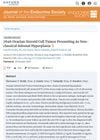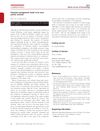 1 citations,
October 2010 in “Cambridge University Press eBooks”
1 citations,
October 2010 in “Cambridge University Press eBooks” The document suggests new ways to assess and diagnose hyperandrogenism to improve accuracy.
 12 citations,
January 2010 in “Pediatric Health”
12 citations,
January 2010 in “Pediatric Health” Early treatment and lifestyle changes are important for managing PCOS in young people to prevent long-term health issues.
 3 citations,
June 2004 in “Reviews in gynaecological practice”
3 citations,
June 2004 in “Reviews in gynaecological practice” Early treatment and weight management are important for teenagers with PCOS to reduce symptoms and long-term health risks.
 12 citations,
October 1995 in “The Journal of Clinical Endocrinology & Metabolism”
12 citations,
October 1995 in “The Journal of Clinical Endocrinology & Metabolism” Skin changes can indicate hormonal imbalances and help diagnose endocrine disorders.
 991 citations,
January 2011 in “Nature Reviews Endocrinology”
991 citations,
January 2011 in “Nature Reviews Endocrinology” The document concludes that PCOS is a complex disorder caused by both genetic and environmental factors, affecting women's health in various ways, and requires personalized treatment.
 249 citations,
November 2003 in “Clinical endocrinology”
249 citations,
November 2003 in “Clinical endocrinology” Insulin resistance is a key factor in polycystic ovary syndrome, but genetics may also contribute.
 January 2020 in “Asian Journal of Basic Science & Research”
January 2020 in “Asian Journal of Basic Science & Research” Nutrease powder, a high-protein, low-carb supplement, can help manage Polycystic Ovary Syndrome symptoms, regulate periods, improve ovulation, and restore fertility.
 2 citations,
September 2014 in “Journal of The American Academy of Dermatology”
2 citations,
September 2014 in “Journal of The American Academy of Dermatology” Obesity may worsen hair loss in men and increase hirsutism in overweight or obese individuals, with weight loss recommended for treatment.
 October 2024 in “Journal of the Endocrine Society”
October 2024 in “Journal of the Endocrine Society” Ovarian steroid cell tumors can mimic adrenal hyperplasia, and surgery can normalize hormone levels.
 January 2016 in “Springer eBooks”
January 2016 in “Springer eBooks” Pubertal acne is linked to hormonal changes, affects quality of life, and is treated similarly to adult acne.
 July 2016 in “British journal of dermatology/British journal of dermatology, Supplement”
July 2016 in “British journal of dermatology/British journal of dermatology, Supplement” Hirsutism treatment should focus more on patient needs and quality of life.
 33 citations,
September 2008 in “Dermatologic therapy”
33 citations,
September 2008 in “Dermatologic therapy” Doctors should know how to diagnose and treat PCOS, which often involves checking for high male hormone levels and using medications to manage symptoms.
 May 2019 in “Paediatrics and child health”
May 2019 in “Paediatrics and child health” The document concludes that personalized treatment, including lifestyle changes and medication, is essential for managing PCOS in teenagers, while also addressing their psychological well-being.
 9 citations,
October 1988 in “Clinics in Dermatology”
9 citations,
October 1988 in “Clinics in Dermatology” Hair loss is caused by genetics and hormones, diagnosed through examination and biopsy, and treated with medications or surgery.
52 citations,
April 2008 in “Therapeutics and clinical risk management” The birth control combination of ethinylestradiol and drospirenone helps treat symptoms of polycystic ovary syndrome.
 January 2025 in “Journal of Clinical Medicine”
January 2025 in “Journal of Clinical Medicine” PCOS is the most common cause of hirsutism, and personalized treatment is important.
 September 2023 in “International Journal For Multidisciplinary Research”
September 2023 in “International Journal For Multidisciplinary Research” Ayurvedic treatments can help manage PCOS symptoms.
 May 2024 in “International Journal of Advanced Academic Studies”
May 2024 in “International Journal of Advanced Academic Studies” Vitamin E helps reduce PCOS symptoms and improves hormonal balance.
 43 citations,
April 2017 in “Experimental Dermatology”
43 citations,
April 2017 in “Experimental Dermatology” Female pattern hair loss has unclear causes, possibly involving genetics, hormones, and environment, and needs better treatments.
 195 citations,
November 2019 in “Clinica Chimica Acta”
195 citations,
November 2019 in “Clinica Chimica Acta” High levels of male hormones, insulin resistance, and obesity are closely linked and worsen polycystic ovary syndrome, but more research is needed to improve treatments.
 23 citations,
January 2013 in “Indian Journal of Dermatology, Venereology and Leprology”
23 citations,
January 2013 in “Indian Journal of Dermatology, Venereology and Leprology” FPHL causes hair loss in women due to genetics and hormones; minoxidil and anti-androgens are treatments, and early intervention is advised.

research Acne
58 citations,
January 1997 in “Dermatologic Clinics” Acne significantly affects mental health and quality of life, with research suggesting hormonal and genetic factors in its development and emphasizing early treatment to prevent scarring.
 2 citations,
September 2012 in “PubMed”
2 citations,
September 2012 in “PubMed” Topical minoxidil effectively treats Female Pattern Hair Loss in women of all ages and hormone levels, but evidence for antiandrogens is limited.
 139 citations,
June 2003 in “Journal of Investigative Dermatology Symposium Proceedings”
139 citations,
June 2003 in “Journal of Investigative Dermatology Symposium Proceedings” Androgenetic alopecia in women needs more research and better management strategies.
 66 citations,
September 2008 in “Dermatologic therapy”
66 citations,
September 2008 in “Dermatologic therapy” The conclusion is that the best initial treatment for hirsutism is usually oral contraceptives, with the addition of antiandrogens or insulin sensitizers if needed, and topical eflornithine or laser treatments as supplementary options.
 21 citations,
September 2017 in “Journal of Obstetrics and Gynaecology Research”
21 citations,
September 2017 in “Journal of Obstetrics and Gynaecology Research” Chromium supplements don't improve insulin, hormone levels, or cholesterol in women with PCOS but raise testosterone levels.
 76 citations,
December 2006 in “Journal of Dermatological Science”
76 citations,
December 2006 in “Journal of Dermatological Science” Japanese women typically start experiencing hair loss after 40, with reduced hair density and thickness being the main factors.
 3 citations,
July 1993 in “Contraception”
3 citations,
July 1993 in “Contraception” Women with moderate body hair have higher levels of certain hormones and may benefit from treatment that increases sex hormone-binding protein.
 4 citations,
August 2013 in “Expert Review of Dermatology”
4 citations,
August 2013 in “Expert Review of Dermatology” Updated treatments for female hair loss include minoxidil, antiandrogens, hair transplants, and light therapy.
January 2022 in “Springer eBooks”




























